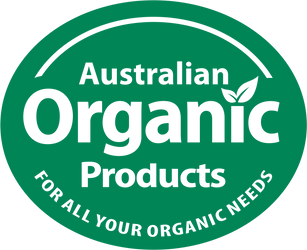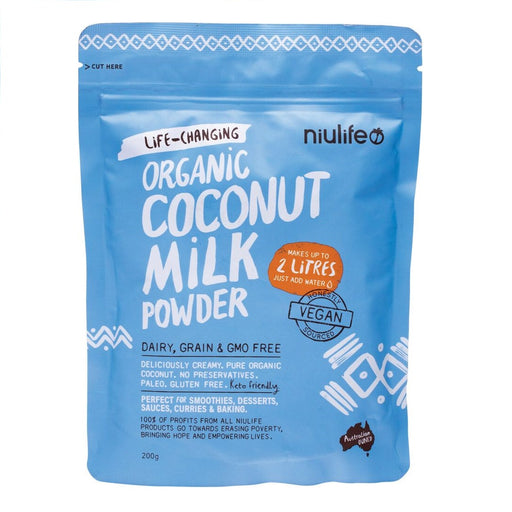Milk powder is formed by evaporating the liquid part of the milk until only the solid fats, proteins, and sugars are left. This is then ground to a powder. For alternative powdered milks, such as coconut milk powder, the process is similar. For example, coconut milk powder is made using the flesh of the coconut, removing moisture, and then grinding to a fine powder.
Organic Powdered Milk
Filters
-
Original price $14.00 AUDOriginal price $14.00 AUD - Original price $14.00 AUDOriginal price $14.00 AUDCurrent price $13.30 AUD$13.30 AUD - $13.30 AUDCurrent price $13.30 AUD| /
Niulife Coconut Milk Powder Makes Up To 2 Litres - 200g
Niulife2 reviewsIn stockDeliciously creamy, nutritious and full of good healthy fats, made from fresh organic coconuts and is nature's 100% plant-based alternative to dair...
View full detailsOriginal price $14.00 AUDOriginal price $14.00 AUD - Original price $14.00 AUDOriginal price $14.00 AUDCurrent price $13.30 AUD$13.30 AUD - $13.30 AUDCurrent price $13.30 AUD| /Save 5% Save %
Buy Organic Powdered Milk Online
We offer a variety oforganic powdered milk to ensure all of our customer’s requirements are catered to, and you can shop filtered ranges of milk powder depending upon dietary needs, including vegan, gluten-free and dairy-free.
The products in our organic range are free from chemical pesticide residue and are grown in a way that will protect the environment from further harm. Shop the fantastic brands in our collections, including Niulife, Organic Times, and Bonvit, to find some fantastic milk powder products.
We’ve carefully chosen each product to ensure it can serve as a part of a healthy and balanced diet and will support our customers’ wellbeing. We think you’ll find something you love in our milk powders range, so why not check it out today?
Organic Powdered Milk FAQs
Milk powder is versatile and is called for in a number of recipes. Appearing in recipes for curries, soups, and stews, it can be added for flavour, thickness, and creaminess. Powdered milk can also be used in baked goods, ice cream, and milkshakes. It can be added to smoothies to add nutritional value too.
Powdered milk is not necessarily healthier than fresh milk, as the nutritional content is generally similar. However, powdered milk has a longer shelf life and can be more convenient to store and use than fresh milk. Additionally, some people may find powdered milk easier to digest, as it contains less lactose than fresh milk. However, it is important to note that powdered milk may contain additives such as emulsifiers or anti-caking agents, which may be a concern for some consumers. Ultimately, the decision to choose powdered or fresh milk depends on individual preferences and needs.
Organic powdered milk should be stored in an airtight container in a cool, dry place. It is important to keep the powder away from moisture, as exposure to humidity can cause the powder to clump and spoil. Once the container is opened, it is recommended to use the powdered milk within two to three weeks to ensure freshness.
While organic powdered milk is a good source of nutrients, it is not recommended as a replacement for breast milk or infant formula. Infants and toddlers have specific nutritional needs that may not be met by powdered milk alone. It is important to consult with a paediatrician or other healthcare provider to determine the best feeding plan for infants and toddlers. Organic powdered milk may be suitable for use in recipes or as a supplement to a balanced diet for older children and adults.
Choosing organic powdered milk may have environmental benefits. Organic farming practices often prioritise sustainability and environmental stewardship by minimising the use of synthetic fertilisers and pesticides, reducing soil erosion, and promoting biodiversity. Additionally, organic farming practices can help to reduce greenhouse gas emissions, which contribute to climate change. By choosing organic powdered milk, consumers may be supporting environmentally-friendly farming practices and contributing to a more sustainable food system.

